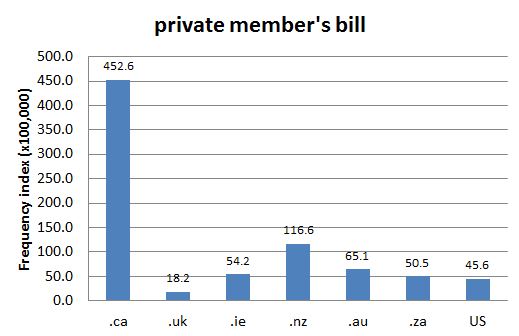DCHP-2
private member's bill DCHP-2 (July 2016)
n. — Politics
a bill introduced by a member of parliament who is not part of the Cabinet.
Type: 5. Frequency — Private member's bill is a preservation from the British legal system, which is used in many former British colonies and Commonwealth countries. Chart 1 demonstrates the prevalence of the term in Canada, which is possibly explained by the relative ease of passing these bills in the Canadian House of Commons. Before 1986, private member's bills could be easily "talked out" in Canada, meaning that a specific time was allocated to debate of these bills, and the time could be purposely wasted in order for the bill to not come to a vote. In 1985, the Special Committee on the Reform of the House of Commons made a report stating that due the inefficiency of the parliamentary system as it concerned these bills (see Parliament of Canada reference, "House of Commons Procedure and Practice - 21. Private Members' Business, Historical Perspective"). Amendments were made the following year based on the committee's recommendations, and since that time an average of about three private members' bills are passed every year (see Parliament of Canada reference "Private Members' Public Bills Passed by Parliament"). From 1986 to 2012 roughly 40% of all the 245 successful private members' bills since 1910 were passed, which is a considerable increase. By comparison, private members' bills in the UK have a much lower success rate, because, as was the case in Canada before 1986, private members' bills in the UK are often "talked out" (see Politics UK reference).
See also COD-2, s.v. "private member's bill", which is marked "Cdn, Brit., Austral., & NZ".- Some private members' bills have become important or highly symbolic pieces of legislation; see, e.g. the 1963 quotation.
- Parliamentary practice adheres to the formal style of plural formation, including the placement of the apostrophe: one <>private member's bill, but several private members' bills.
References:
- COD-2
- Parliament of Canada "Private Members' Public Bills Passed by Parliament" Accessed 11 Jun. 2013
- Parliament of Canada "Private Members' Business - Historical Perspective" Accessed 11 Jun. 2013
- Politics UK "Private Members' Bills (Commons)" Accessed 11 Jun. 2013
Images:
Chart 1: Internet Domain Search, 4 Oct. 2012
